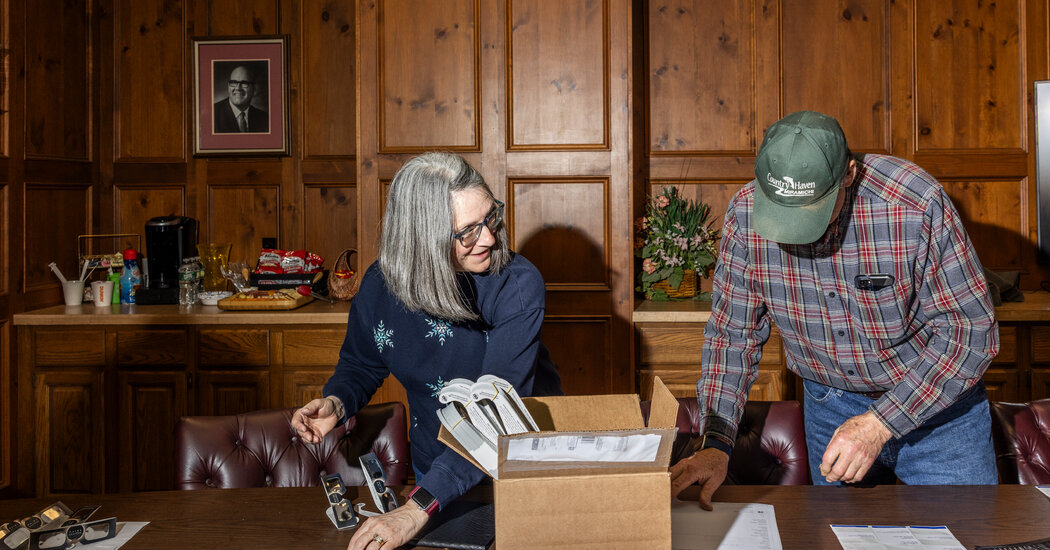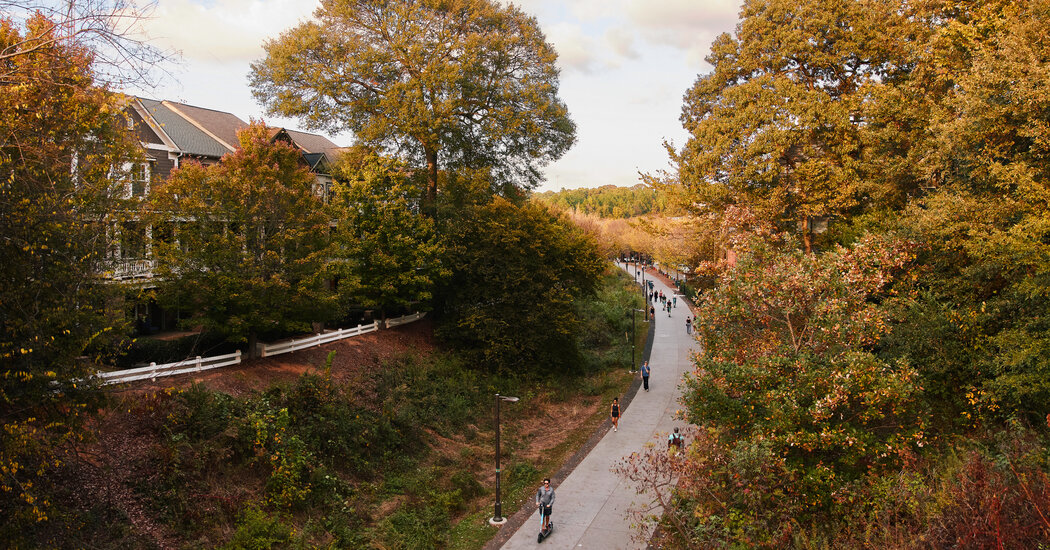For generations, visitors to Maine have flocked east to the rocky coastline, with its lobster boats and crashing waves, or west to ski resorts, peaceful lakes and mountains. Few ever set foot in Aroostook County, a remote northern expanse where residents are prone to suspect — not without reason — that no one south of Bangor even knows that they exist.
So the news that “the County,” as it is known in Maine, would be smack in the path of totality for next month’s solar eclipse — making it a destination for potentially thousands of visitors — has generated mixed emotions in this proudly unpretentious place. Accustomed to ceding the spotlight to showy spots like Bar Harbor, some in the county are not sure how they feel about its fleeting status as the place to be.
“It’s a little new for us here, so it is stressful,” said Lindsay Anderson, manager of Brookside Bakery in Houlton, a town of 6,000 that borders Canada, where the plan for eclipse weekend includes baking 500 whoopie pies, Maine’s official “state treat.”
Next door at Market Square Antiques and Pawn, a compact shop watched over by several mounted deer heads, Tom Willard, a co-owner, had worries of his own.
“Where are 20,000 people going to pee?” he asked.
No one knows how many people will travel to Aroostook County for the eclipse on April 8, making planning a bit of a roulette spin. Estimates range from 10,000 to 40,000, though the turnout may be curtailed by sheer distance. Extending north beyond the end of Interstate 95 to the Canadian border — where the little-known, combat-free Aroostook War raged from 1838 to 1839 — the county is about as large as Rhode Island and Connecticut combined. Caribou, near its northern apex, lies 400 miles north of Boston, a drive of more than six hours.
For eclipse fanatics, though, it might not matter. Dan McGlaun, 60, who has seen 15 eclipses and runs a website dedicated to the one next month, said he had once traveled to French Polynesia and hiked “eight miles through banana plants into the middle of nowhere” in order to be — for 1.5 seconds — the only person on earth in the path of the eclipse, by his own estimation.
“Eclipse geeks, we’re a weird lot,” he conceded.
Northern Maine is not the only remote corner of the country expecting an influx. The path of totality also crosses places including the Ozarks, the Choctaw Nation in Oklahoma, and sections of South Texas, all of them hoping to capitalize on the fleeting attention.
In Aroostook County, where potato farms abound and practicality is paramount, tales like Mr. McGlaun’s only add to the general wariness. It does not help that the eclipse will take place during northern New England’s infamous mud season, when the thawing earth turns into tire-sucking muck, heightening concerns that unsuspecting drivers “from away” will get stuck on rural roads and have to be pulled out.
Also not helping: memories of the last major influx, in August 1997, when an outdoor concert festival by the band Phish drew 65,000 fans to a former air force base in Limestone, a town of 1,500. Locals who had scoffed at attendance projections were caught off guard when the crowds materialized, causing traffic gridlock and emptying grocery store shelves. (“Like locusts,” one county resident recalled.)
Conditioned by decades of population drain, some again doubted predictions of crowds when talk of the eclipse began two years ago. That’s when Houlton’s eclipse committee sprang into action, convincing the town that it needed to start planning — and capitalizing on the fact that it will be the last American town in the path.
“The biggest challenge was people not taking it seriously — saying, ‘What’s the big deal, it’s three minutes of darkness, who’s going to come here for that?’” said Johanna Johnston, a lead organizer of the town’s eclipse events. “We needed to explain that it’s not like anything you’ve ever experienced, and it’s an opportunity to show what we can do and what we have to offer.”
Many businesses have seized the opportunity. Ivey’s Motor Lodge in Houlton received its first eclipse booking in 2022, its manager said; when the hotel realized what was happening, it tripled its rates for the nights around the eclipse and tightened its cancellation policy. Most area hotels are fully booked for the event, but Ivey’s still had vacancies earlier this month, possibly because it was charging $650 per night.
Mindful that their 15 minutes of fame will last for only three minutes and 18 seconds (the phase of totality, when the moon will completely block out the sun, begins at 3:32 p.m. in Houlton), the eclipse committee has planned four days of festivities meant to entice travelers to arrive well ahead of the main event — and maybe even come back for another visit.
The town will have six designated “star parks” for eclipse viewing and a crew of welcoming “eclipse ambassadors” to offer guidance. To help feed crowds if restaurants are overwhelmed, several churches plan to offer traditional Maine suppers with baked beans and chowder.
Jane Torres, executive director of the Houlton Chamber of Commerce, has hired a performance art troupe from Rhode Island for the occasion, assisted couples looking to get married in town during the eclipse, helped arrange a NASA broadcast in a historic downtown movie theater that will show the eclipse as it moves across the country, and enlisted her yoga teacher to fill a “metaphysical tent” with tarot card readers and healing demonstrations.
She has also rented 100 portable toilets, a number she acknowledged was a hopeful shot in the dark.
“The challenge is the unknown,” Ms. Torres said.
The unknown that looms largest is the weather in northern Maine in early April. Among the 15 states in the path of totality, Maine has some of the slimmest odds of clear skies — and the best chance of snow — a factor likely to drive hard-core eclipse aficionados, known as umbraphiles, to locations where cloud cover is less likely. (Ironically, perhaps, Aroostook’s name comes from a native Mi’kmaq word that means “clear.”)
According to Priscilla Buster, a meteorologist with the National Weather Service in Caribou, the chances of cloudy conditions at the time of the eclipse are between 60 and 70 percent.
“It’s not looking good for us up here,” she said.
The threat of clouds drove Lynda Mitchell to cancel her hotel reservation in western Maine — Franklin County, part of which will see totality — and book plane tickets to Texas instead.
“It could be awesome in Maine, but I just don’t trust the weather,” she said. “I’m not really a bucket list person, but this isn’t going to happen again in my lifetime.”
Still, Houlton’s eclipse committee is keeping its chin up. Its hopes were recently buoyed by an article describing an “eclipse cooling effect,” observed by scientists, that causes clouds to dissipate when the sun dims and temperatures drop.
Kevin McCartney, a retired geology professor at the University of Maine at Presque Isle, will be focused on another sun on eclipse day. That morning, he plans to unveil a new 3-D model of the sun at the campus entrance, standing 40 feet high. It will serve as the new northern terminus of the Maine Solar System Model, a sprawling roadside attraction installed 20 years ago along 100 miles of rural U.S. Route 1 in Aroostook County, with “planets” spaced at intervals proportional to their actual distances from one another in space.
“Ready to travel the solar system from the comfort of your car?” its website asks.
The largest such model in the Western Hemisphere, and a top tourist attraction in the county, it attracts families and, “believe it or not, solar system model enthusiasts,” Mr. McCartney said. The new sun, visible from Route 1, will be easier to find than the old, two-dimensional one, painted on the walls inside the university’s science museum — and it will shine even when the county’s skies are cloudy.
“People are always wandering the campus asking, ‘Where is the sun?’” he said. “Now they won’t be able to miss it.”







